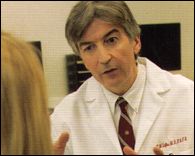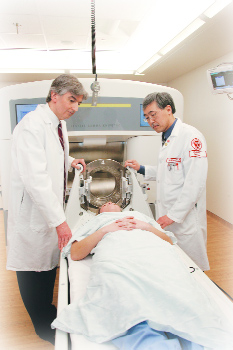Temple Neurosurgeon talks treatment and prognosis for Senator Kennedy
|
Doctors at Massachusetts General Hospital recently diagnosed Sen. Edward Kennedy, D-Mass., with malignant glioma. The most common type of brain tumor, malignant gliomas make up more than half of the approximately 18,000 primary malignant brain tumors diagnosed each year in the United States, according to the National Cancer Institute. |
|
|
Christopher M. Loftus MD, Professor and Chairman of Neurosurgery at Temple University School of Medicine and Hospital, explains that seizures are a very common first sign or symptom of a brain tumor. And although he is not familiar with the specifics of Kennedy’s case, Loftus surmises that doctors diagnosed the tumor via CT scan, followed by MRI, and finally a needle biopsy to get a tissue sample and figure out the grade of the tumor. There are four grades of tumor, based on the abnormality of the cancer cells within the tumor. Experts believe that Kennedy is likely at grade III or IV, with grade IV being the most severe. |
 Christopher Loftus, M.D., professor and chair of neurosurgery
|
|
If at all possible, surgeons typically remove the tumor at the same time as the tissue biopsy. This didn’t occur in Kennedy’s case, which Loftus says indicates that the tumor is in a delicate position within the brain. This means future surgery is also not likely. |
||
 Doctors Christopher Loftus and Curtis Miyamoto perform gamma knife surgery, an extremely precise method of delivering radiation to a brain tumor.
|
Because of the presumed tumor location in a critical brain area, Loftus believes that “biopsy only” was chosen as the best treatment for the senator. Treatment will also no doubt include radiation and chemotherapy. “Unfortunately, I think it is unlikely that he will function at a high intellectual level for very long as the disease progresses,” Loftus said. Brain tumor surgery is the most common type of neurosurgery performed at Temple, where there are currently five qualified surgeons, including Loftus. Temple also offers very sophisticated radiation therapy for brain tumors including gamma knife surgery, an extremely precise method of delivering radiation to a brain tumor. Dr. Loftus and other Temple experts, Dr. Ausim Azizi, chair of neurology, and Dr. Kristin Gabriel, neuro-oncologist, are available for interviews and comment. For assistance, contact Eryn Jelesiewicz in news communications at 215-707-0730 or dobeck@temple.edu. |
|